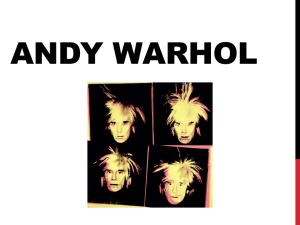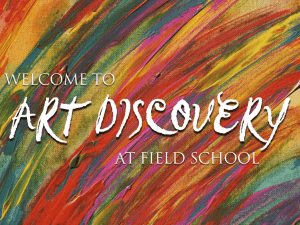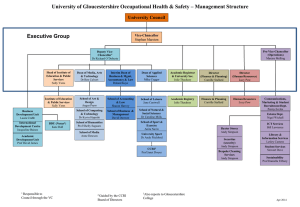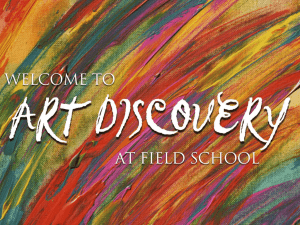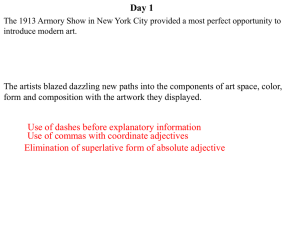Biography - Andy Warhol Museum
advertisement
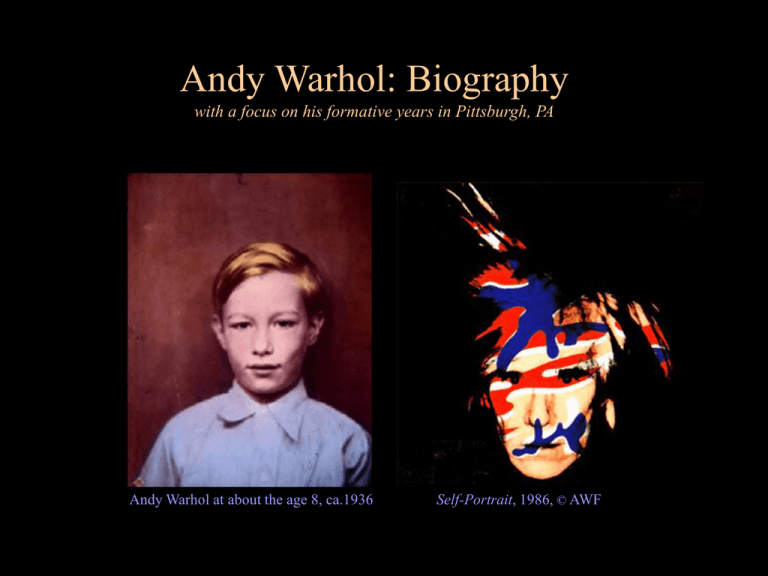
Andy Warhol: Biography with a focus on his formative years in Pittsburgh, PA Andy Warhol at about the age 8, ca.1936 Self-Portrait, 1986, © AWF The Warhola Family (Andy at left) ca. 1938 The Warholas immigrated to the United States from a small town in Eastern Europe called Mikova. The family was Carpatho Rusyn in heritage, and like many of their relatives sought new opportunities for work in America. Many Warholas settled in Western Pennsylvania between 1917 and 1930. For rusyn article in Time Magazine http://www.time.com/time/europe/html/050829/rusyn.html Settling in Pittsburgh was both advantageous and difficult for immigrants. This expanding industrial capital offered thousands of jobs in steel production, factories and railroads Living conditions however were dirty and meager due to soot , manufacturing fumes and crowding. The Warholas rented several tiny apartments very close to the steel mills before buying a small house in the Oakland neighborhood of the city in 1934. Andrei Warhola worked construction and labor jobs. He helped move several large buildings with the Eichley Co. Julie Warhola worked to raise her three sons, Paul, John and Andy, as well as earning cash here and there through cleaning houses and selling handmade crafts. Julia Warhola with sons John (left) and Andy (right), 1932 Andy Warhol's autographed photographs of movie stars, ca. 1940 Andy was diagnosed with St. Vitus Dance at the age of 8 which kept him home from school for long stretches of time. During his ample free time he began collecting movie star photographs and putting them in scrapbooks. He fell in love with Hollywood, photography, drawing, cartoons and magazines. Andy and his brothers Paul (left) and John (right), ca. 1942 The Warhola family doted on Andy and bought him a camera in 1937. Andy is pictured to the right, above: with his two older brothers John and Paul, below: with his dog Lucy and mother in the background Andy Warhol with dog Lucy, ca. 1945 The family was very strict and observant of Byzantine Catholicism. Andy was baptized and attended mass regularly with the family throughout his formative years. Warhol used motifs from his religious heritage throughout his art career from iconic paintings of movie stars to decorative motifs in his commercial illustrations derived from traditional Rusyn egg painting called pysanky. Reproduction of a Madonna and child, archive material from the Warhola home. Twenty Marilyns, 1962, ©AWF © TM 2005 Marilyn Monroe LCC Pysanky eggs created during Carpatho Rusyn Day at AWM Gift Package, 1950s, © AWF Girl in Park, 1948, AWF Andy attended Holmes Elementary School and then Schenley High School, both within walking distance from his home. He showed an early interest in art and was recommended for free art classes at the Carnegie Museum of Art in elementary school. Andy spent many afternoons drawing in the park with his friend Nick Kish. “1942-1944 were some of the saddest years for Andy and the family.” --John Warhola © 2006 Life Inc. WWII was the backdrop to hard times in the Warhola family. In 1942 Andrei Warhola died after an extended illness. Julia was diagnosed with cancer, but recovered after an operation and long bed rest. During this time Andy took care of Julia after school while Paul Warhola came back from the Navy to work at home and on night shift. Andrei Warhola specified before he died that his life savings in postal bonds were to be used for Andy’s college education. In 1945 Andy began classes as a freshman at Carnegie Institute for Technology* in Pictorial Design. Warhol both impressed and baffled professors with his quirky solutions to Women and Produce Truck, 1946, © AWF problems and his very A drawing done by Andy unique style. while at CIT of his brother *CIT, later changed to CMU, Carnegie Mellon University of Pittsburgh Paul selling from a truck. Andy would sell his sketches for 25 cents and received a college award of $20 for this work. Legs in Red High Heels, 1950s, AWF "The French Look", 1950s, © AWF Winged Figures and Fashion Accessories (detail), 1950s, ©AWF Warhol moved to NYC in 1949 and worked as an illustrator for more than 10 years. He received numerous professional awards for his work and had hundreds of clients. Andy had experimented with changing his name in high school and after the move to New York he dropped the ‘a’ from Warhola completely. Angel, c. 1957, Female Head, 1950s, Girl's Head, 1950s, Butterflies, 1952 all images © AWF Warhol invented a blotted line technique which he used along with rubber stamps to create whimsical, decorative and stylish illustrations. <link to blotted line and rubberstamp activities> In 1961 Warhol started making and exhibiting Pop Art. Through almost four decades of work, Warhol created paintings, prints, films, photographs, television programs, books, magazines and a persona that became world famous. photo by Ellen Johnson (bottom left) photo by Stephen Shore (right) Like many of the factories that surrounded him as a boy in Pittsburgh, Warhol created his own “Silver Factory” studio space as a mature artist in 1964. In this environment he was able to produce large series of artworks and sculptures. Warhol created many films and experimental pieces in this space, collaborating with assistants and poets, musicians, dancers, writers and other creative people. Campbell's Soup I: Black Bean, 1968, © AWF Campbell's Soup installation at The Ferus Gallery, 1962 Warhol created works of Pop Art, appropriating imagery from consumer culture and breaking the boundaries between high art and lower forms of visual imagery such as advertising and packaging. Above, Liz, 1964, © AWF Right, Female Movie Star, Composite, ca. 1962, © AWF Warhol created some of his most famous works from Hollywood promotional photographs and stills. Factory Diary: Andy Warhol Painting Drag Queen, 1974, © AWM Warhol used photographic silkscreen printing in his work from the 1962 until 1987. This technique allowed him to appropriate and manipulate photography and imagery from any source and to apply this imagery over a painted or treated surface in either single renditions or multiple times. photo by Richard Pipes Liza Minnelli, 1977, © AWF Liza Minnelli, 1979, © AWF Books by Andy Warhol Warhol not only used printmaking but audio recording, photography, filmmaking, and collaborative painting to create works. Throughout the 70s and 80s Warhol continued many diverse projects and collaborated with younger artists such as Jean Michel Basquiat, Keith Haring and Francesco Clemente. Andy Warhol's and Jean Michel Basquiat's Collaboration, 198485, © AWF Beginning in 1964 Warhol exhibited his work internationally, mainly in Europe but also in South America, Asia and the Middle East. In 1971 a retrospective of his work was held in NYC after it was seen in Pasadena, London, Paris and the Netherlands. Andy Warhol exhibition, 1970, Pasadena Museum of Art Andy Warhol exhibition, 1971, Whitney Museum of American Art After 3+ decades of work as painter, filmmaker, photographer, music promoter, illustrator, author, publisher, collector and model, Warhol died in 1987 of complications following gallbladder surgery. Daily News, February 23, 1987, © 2006 Daily News L.P. Andy Warhol’s legacy continues today through his enormous influence on the work of younger artists and through his own art visible around the world in galleries and museums. Self-Portrait, 1986, © AWF photo by Terry Clark Diamond Dust Shoes (1980), and Eggs (1982) installation photo by Paul Rochelaeu Unless otherwise noted, all Andy Warhol artwork is ©The Andy Warhol Foundation for the Visual Art, Inc.
